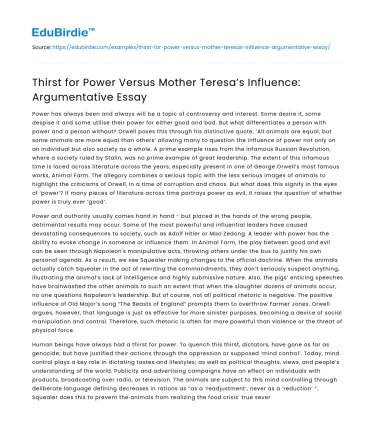Power has always been and always will be a topic of controversy and interest. Some desire it, some despise it and some utilise their power for either good and bad. But what differentiates a person with power and a person without? Orwell poses this through his distinctive quote, ‘All animals are equal, but some animals are more equal than others’ allowing many to question the influence of power not only on an individual but also society as a whole. A prime example rises from the infamous Russian Revolution, where a society ruled by Stalin, was no prime example of great leadership. The extent of this infamous time is laced across literature across the years, especially present in one of George Orwell’s most famous works, Animal Farm. The allegory combines a serious topic with the less serious images of animals to highlight the criticisms of Orwell, in a time of corruption and chaos. But what does this signify in the eyes of ‘power’? If many pieces of literature across time portrays power as evil, it raises the question of whether power is truly ever ‘good’.
Power and authority usually comes hand in hand - but placed in the hands of the wrong people, detrimental results may occur. Some of the most powerful and influential leaders have caused devastating consequences to society, such as Adolf Hitler or Mao Zedong. A leader with power has the ability to evoke change in someone or influence them. In Animal Farm, the play between good and evil can be seen through Napoleon's manipulative acts, throwing others under the bus to justify his own personal agenda. As a result, we see Squealer making changes to the official doctrine. When the animals actually catch Squealer in the act of rewriting the commandments, they don’t seriously suspect anything, illustrating the animal’s lack of intelligence and highly submissive nature. Also, the pigs’ enticing speeches have brainwashed the other animals to such an extent that when the slaughter dozens of animals occur, no one questions Napoleon’s leadership. But of course, not all political rhetoric is negative. The positive influence of Old Major’s song “The Beasts of England” prompts them to overthrow Farmer Jones. Orwell argues, however, that language is just as effective for more sinister purposes, becoming a device of social manipulation and control. Therefore, such rhetoric is often far more powerful than violence or the threat of physical force.
Save your time!
We can take care of your essay
- Proper editing and formatting
- Free revision, title page, and bibliography
- Flexible prices and money-back guarantee
Human beings have always had a thirst for power. To quench this thirst, dictators, have gone as far as genocide; but have justified their actions through the oppression or supposed ‘mind control’. Today, mind control plays a key role in dictating tastes and lifestyles; as well as political thoughts, views, and people’s understanding of the world. Publicity and advertising campaigns have an effect on individuals with products, broadcasting over radio, or television. The animals are subject to this mind controlling through deliberate language defining decreases in rations as “as a ‘readjustment’, never as a ‘reduction’ ”. Squealer does this to prevent the animals from realizing the food crisis’ true severity, which may lead to some discontent among the animals.
On a positive, we can look at the character of Mother Teresa. Her passion and influential power created a worldwide mission in many countries. Mother Teresa was a very motivated individual as she had positive work to be done and never walked away from her mission. Mother Teresa didn’t have the desire to be a powerful leader but she stayed in the role for the reason that she had a high need for socialized power. Simply put, Teresa was willing to put herself in a role she found uncomfortable for the higher goals of her organization. Socially, Mother Teresa was a well-liked if not a loved role model. As far as Mother Teresa’s influencing tactics, she used the coalition to engage followers to aide in the objective of aiding the poor. She used her power to influence the alliance amongst her followers; they had the desire to comply with Mother Teresa’s influence.
Power is multifaceted. It can change individuals or societies for the better or for worse. Throughout time, we have seen that power and influence can be a good mechanism in the changing of behaviours. The fact that power can bring about a change in one’s behaviour means that sometimes the power is appropriate and sometimes it is not.






 Stuck on your essay?
Stuck on your essay?

